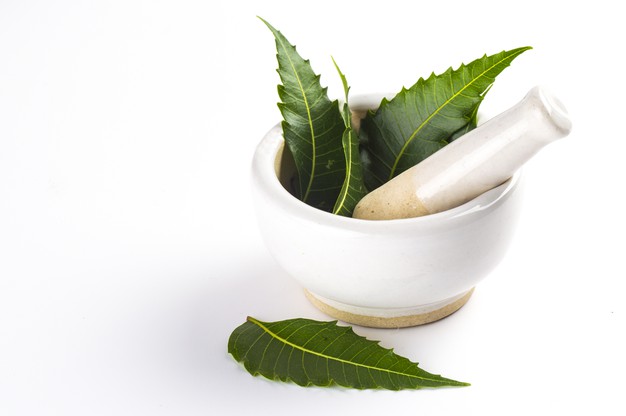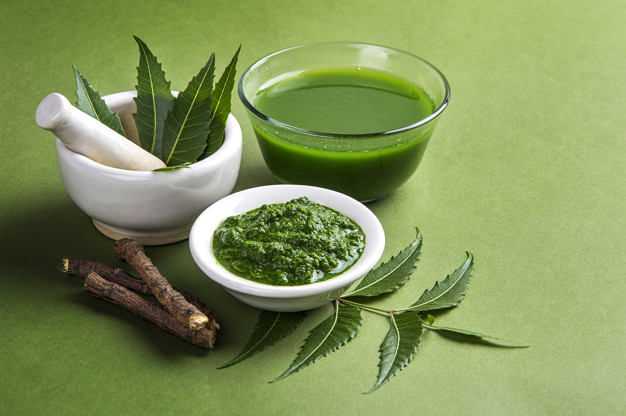Neem, detoxifying property, antimicrobial activities, anti-inflammatory and antioxidant properties
Description : The bark, flowers, seeds and leaves of neem have profound health benefits and they are widely used
Article Details :
Neem is an important tree belongs to the genus Azadirachta and Meliaceae family. It is generally grown in tropical as well as subtropical region and it is native to India. The bark, flowers, seeds and leaves of neem have profound health benefits and they are widely used for preparing various medicines, cosmetic products and therapeutic supplements.
Nutritional profile
- It contains lesser amount of carbohydrate
- It contains adequate amount of dietary fibre
- It also contains too some extent of protein and it is significantly rich in some amino acids, which include alanine, glutamic acid, tyrosine, aspartic acid and cystine
- It contains negligible amount of fat thus it is considered as a poor source of fat
- It is totally free from cholesterol
- It is packed with various important micronutrients, such as vitamin A, Vitamin C, calcium, phosphorus, potassium, iron and magnesium
- It contains several imperative biological active compounds that help to make neem relatively healthier. These compounds include flavonoids, coumarins, terpenoids, tannins, alkaloids and sulphurous compounds

Biological property
Antioxidant activity
- Nimbolide and quercetin are the two most important substances found in neem, are responsible for exhibiting antioxidant activities
- It plays significant role in reducing the concentration of free radicals within body hence helps to protect the body from their harmful effects
- It also helps to decrease oxidative stress
- Its consumption is very effective for decreasing the susceptibility of developing chronic diseases
Detoxifying activity
- Neem leaves are well known for their cleansing property
- It plays significant role in stimulating the elimination of toxins from body
- It is better to consume neem leaf juice for reducing the concentration of toxins within blood
Anti-microbial activity
- It exerts strong antimicrobial activities, which are associated with preventing the growth and reproduction of microbes within host thus its consumption is most significant for lessening the risk of developing infectious diseases
- It is very effective for destroying bacteria and reduces the prevalence of bacterial infestation and its harmful consequences
- It is also extremely helpful for suppressing the growth of fungus even it is related with destroying them completely
Health benefits of Neem leaves
Role on immunity
- Its antimicrobial, antioxidant and micronutrients contents are responsible for strengthening the immune system of body
- It helps to improve the diseases fighting capacity of body thus helps to reduce the susceptibility developing diseases (communicable as well as non communicable)
Role on skeletal system
- It contains significant amount of calcium, which plays vital role in the growth and development of skeletal system
- It promotes the synthesis of healthy bone tissues
- It also helps to improve bone mineral density that is related with enhancing bone mass
- It plays imperative role in strengthening the bone and reduces the susceptibility of developing bone disorders
- It has seen that application of neem oil on joints significantly reduces joint inflammation and also helps to reduce arthritic pain
Role on oral health
- Consumption of neem leaves are very beneficial for maintaining a good oral hygiene
- It plays imperative role in preventing microbial infestation within oral cavity and its antimicrobial property is accountable for destroying those microbes, which are responsible for developing oral infections
- It is associated with maintaining the normal alkalinity of saliva, which helps to kill germs and provides a fresh breath
- Consumption of neem leaf extract is very affective for preventing the prevalence of dental carries
- It also helps to prevent dental plaque formation
- It helps to prevent gum infections as well

Role on digestive health
- It plays significant role in promoting digestion
- It also helps to improve liver function
- It helps to prevent fatty infiltration of liver that ultimately reduces the risk of developing hepatic disorders
- It is also associated with destroying harmful microbes of intestine that helps to make the intestine (especially the colon) clean
- It helps to protect the gastrointestinal tract from oxidative and inflammatory damages hence reduces the prevalence of various gastrointestinal disorders like irritable bowel syndrome, diverticular disease, inflammatory bowel disease, constipation, ulcerative colitis Read more




